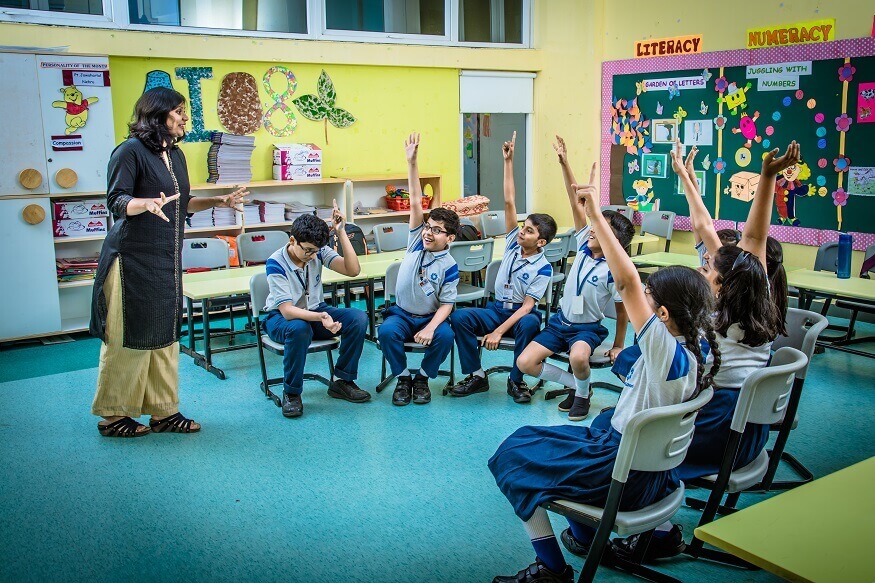Asking questions holds the power to increase knowledge. Questions have the ability to foster stronger connections. For a toddler, questions serve as a gateway to curiosity, knowledge, and vocabulary expansion. By questioning everything, children compel adults and others to provide answers, thus nurturing their curiosity. A child’s curiosity manifests as a pure form of inquiry, with the answer being inconsequential. While we may consider a child’s queries about familiar objects like cars, laptops, or cameras irrelevant due to our existing knowledge, the essence lies in the act of questioning rather than the answer itself. In the realm of questioning, the key lies in the interaction. This blog will highlight why we should encourage students asking questions in the classroom.
Voltaire, the 18th-century French philosopher, stated, “Judge a man by his questions.” However, as people grow older, things change. Initially, toddlers ask questions in classrooms, whether they are perceived as silly or resourceful. As they progress through their education, the focus shifts more towards finding answers. Regrettably, the questioning aspect starts to lose its significance. When secondary school approaches and the pursuit of exam results takes precedence, the emphasis shifts away from the question itself. Instead, students solely strive to produce answers that can help them achieve the desired grades.
As individuals mature, they perceive questions differently. Instead of viewing a question as a genuine inquiry, it becomes something imposed by others. In such cases, little thought is given to the question itself. This perspective is carried from childhood into adulthood, accompanied by the belief that every question must have a correct answer; otherwise, the question itself is deemed flawed.
The classroom is filled with students asking questions in the classroom, and undoubtedly, answers hold importance. However, in everyday life, questions hold even greater significance. The questions that drive discovery are truly remarkable and can never be overused. They foster connections, facilitate empathy, allow us to understand others, and shed light on the reasons behind the status quo. Parents can adopt the strategy of “Ask more and tell less,” enabling children to develop a positive relationship with asking questions in the classroom without the fear of negative consequences. Questions such as “How did it feel when…,” “How was that…,” “How was your day at school…,” “What are your thoughts on…,” and “Tell me more” are invaluable and can be asked without restraint.
While questions are generally beneficial, it’s important to note that not all questions are good, and some can even be detrimental.
Various types of questions
Closed-ended questions: Closed-ended questions restrict the response to a direct answer, leaving no room for further questioning or doubts regarding the conversation topic. They serve the purpose of limiting interaction. Closed-ended questions typically elicit short and specific answers such as Yes/No/True/False/Agree/Disagree. Examples of closed-ended questions include “Do you agree with this proposal?” “Did you eat?” “Do you think ___ is relevant?” The importance of questioning in the classroom also involves teachers asking the right type of questions to students.
Open-ended questions: Open-ended questions allow for a wide range of possible answers. These questions often begin with “why” or “how” and are descriptive in nature, encouraging a detailed response. Open-ended questions are used to initiate or facilitate in-depth discussions. Phrases like “tell me,” “please explain,” “can you describe,” and “will you be comfortable to elaborate” are used to engage in open-ended questioning.
Indirect questions: Indirect questions are not specifically directed towards anyone or anything. They are generally posed to provoke thoughts or ideas.
Direct questions: Direct questions, on the other hand, are directed towards an individual or a group of people in an audience. For instance, a teacher may ask a question to a specific student by addressing them by name or ask a gender-specific question to a particular gender.
Probing questions: Probing questions are investigative in nature and are often used to gather more information about a situation or scenario. Parents may employ probing questions to delve deeper into their child’s activities and gain a better understanding of what was taught in class.
Leading questions: Leading questions can put pressure on the person being questioned. They are often delicate in nature. For example, a parent may inquire about their child’s homework by asking, “When did you lose the homework?” This type of leading question seeks to obtain information about whether the homework was lost and why it was not completed. These questions indirectly exert pressure on the child.
Rhetorical questions: Rhetorical questions serve as a playful way to evade an obvious answer. They can be answered directly or in a humorous and indirect manner. For example, “Do you like chocolates?” is a rhetorical question as the most obvious answer is “YES.” It can be responded to rhetorically and humorously. Other examples of rhetorical questions include “Is Math your favorite subject?” and “Do you love going to school?” or “Do you like ice cream?”
Teachers play a crucial role in the classroom by posing the right type of questions to students at the appropriate time and in the suitable space, highlighting the importance of questioning in the learning environment.
When students ask questions in the classroom, it becomes vital for their growth, confidence, development of critical thinking skills, and the fostering of a curiosity-driven learning experience. Their inquiries serve as a valuable indicator for teachers to gauge whether the class is engaged and attentive to the educational content being provided. As students actively participate in classroom discussions through their questions, they are encouraged to take on challenges and delve deeper into the subject matter being taught. By recognising the significance of questioning in the classroom, children can unlock new levels of learning and embark on a lifelong journey of knowledge acquisition. And this is why we should encourage students asking questions in the classroom.
Also Read: Importance of a Growth Mindset in Your Teaching
At EuroSchool, we promote a culture where children are encouraged to be confident and appreciate the value of asking questions during their classroom education.









